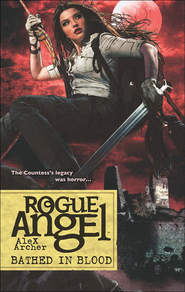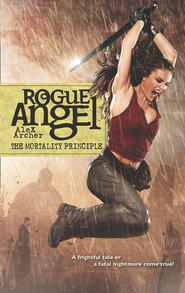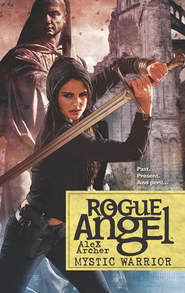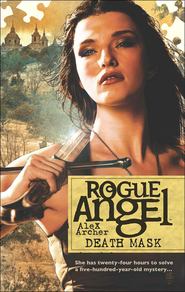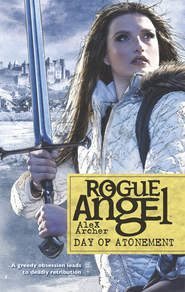По всем вопросам обращайтесь на: info@litportal.ru
(©) 2003-2025.
✖
Tear Of The Gods
Автор
Год написания книги
2019
Настройки чтения
Размер шрифта
Высота строк
Поля
Nothing, it seemed, could stand in their way.
Nothing, that was, until the coming of Gaius Suetonius Paulinus.
Even thinking of the Roman’s name was enough to make Myrrdin curse aloud and spit on the ground. He longed to carve the man’s flesh from his bones and feed it the crows. He prayed to the gods that he would get his chance before the battle was over.
What a difference seventy-two hours made.
Less than five thousand men remained of the army that had met Paulinus and the soldiers of the XIV Gemina on the field of battle three days before. Few, if any, of his senior commanders still lived, for they had stood their ground and fought on even when the battle had turned in the Romans’ favor. Myrrdin would have gone down fighting alongside them if the queen hadn’t ordered him to retreat, to ensure that someone still remained who could rally the remnants of the Iceni and see to it that their people’s sacrifice was not in vain.
How he wished he had never left her side!
He reached up and fingered the torc he wore about his neck, the one Boudica had entrusted to him before the battle. She’d always claimed it to be the root of her power, that the metal from which it was formed, the metal given to them by the very gods themselves, protected her time and time again. But Boudica was dead now, poisoned by her own hand while in Roman custody rather than be handed over to Paulinus’s troops as a plaything for their amusement. When word reached him earlier that morning of her fate, he wept, wondering if he’d condemned her to death simply by taking the torc.
Not that it mattered now; what was done was done.
Myrrdin was a good enough tactician to know that at this point there was no way the Iceni could win. They were outnumbered and the Romans were not only better armed but better armored, as well. If he hadn’t been able to beat them with eighty thousand warriors at his command, there was no way he was going to be able to do so with only five thousand. But there was no question of retreat. He would rather die on the field of battle, sword in hand, than be hunted down like a dog in the weeks to come.
And perhaps, Awran willing, he could take a few Romans with him as an offering before it was his time to die.
He let his gaze roam over the soldiers gathering on the field below. Unlike his ragtag band of warriors, who often wore as little into battle as possible, the Romans were all dressed in identical coats of chain armor worn over a short jerkin with thick-soled leather sandals on their feet. They each carried two iron-tipped spears, pilums he’d heard them called. The short swords were designed primarily for stabbing in close-quarter combat. The soldiers also held large rectangular shields, big enough to cover a man from ankle to chin.
The legion’s standard, a charging boar on a field of crimson that was so dark as to be almost purple, flapped in the afternoon breeze, the Romans arrogantly claiming this land on behalf of the Emperor.
Myrrdin turned and surveyed the men assembled behind him. What a sharp contrast to those they were about to face. Where the Romans were tall and muscled from years of disciplined labor, his men were smaller and wiry in nature, built for speed and dexterity. Where the Romans were armored and carried multiple weapons, many of his men were naked or nearly so, their fair skin decorated in blue woad. They clutched swords made of iron and carried small, round shields of leather stretched over wooden frames.
Of his illustrious horse soldiers, less than fifty remained. They sat stiffly in the saddle off to his right, weary from the days of fighting and the long chase they had endured so far, yet none hesitated to return his gaze or gave any sign they would shy away from the confrontation to come.
As he turned away, one thought was prominent in his mind.
We don’t stand a chance.
Myrrdin shook his head, clearing it of such defeatism. The simple fact was he no longer had any choice; there was nowhere else to run. He’d never get his men through the bogs on the other side of the hills before the enemy could catch up with them. He had no choice but to stand and fight.
Like all good commanders, Myrrdin wanted that fight on his terms, not the enemy’s, which was why he’d assembled his men along the crest of the hill while the Romans attempted to set up camp in the valley below. He hadn’t been able to choose the field on which they would meet, but he’d be damned if he wouldn’t choose the time.
And that time was now, before the enemy got themselves organized and settled in.
He brought his horn to his lips and blew a long blast. The sound echoed across the valley, like a great voice shouting from the hilltop, and Myrrdin smiled in defiance as he watched the Roman soldiers milling about in response.
Behind him, his men took up the call to battle, pounding the flats of their swords against their shields, calling up a frightful racket, letting the spirits know that there would soon be newcomers, friend and foe alike, entering the land of the dead. Bare-breasted women moved among the ranks, screaming in hatred at the Romans massed below and whispering words of encouragement to their men, stoking the twin fires of courage and power.
Myrrdin let it build for a few minutes, allowing his men to whip themselves into a killing frenzy, and then, when he judged the time was right, he raised his right arm above his head, his fist clenched for all to see, and then brought it slashing downward.
Like a breaking wave his army surged into motion, pouring down the hill toward the enemy, shrieking their war cries as they went.
With a joyous shout, Myrrdin spurred his horse and joined them, thundering down toward the rapidly forming enemy line. Behind him came the rest of his horse soldiers, their voices raised in harmony with his own.
Ahead of them the Romans stood shoulder to shoulder in a long, unbroken line, waiting with disciplined ease for the enemy to make contact, their oversize shields held before them to form a wall. As the Iceni warriors closed in, the Romans unleashed a blistering rain of stones and spears from behind the protection of that wall, hoping to blunt the force of the attack. The Iceni had faced the Romans before, however, and they were ready, having expected just such a move. Almost as one they bent low over their mounts, their heads sheltered by the animals’ long necks, and as a result the majority of them made it through the storm unscathed.
Mere yards separated the two forces and Myrddin felt his lips peel back from his teeth as he bared them at the enemy like a wild animal defending its den. Heart racing, blood pumping, he let out another shout of defiance and drove his horse right into the ranks of the enemy, smashing aside that wall of shields, trampling those foolish enough to stand firm in the face of the attack under the hooves of his battle-hardened mount. Beside him, his horse warriors did the same, smashing aside the Roman line, creating a breach for their foot soldiers to exploit as they caught up with the charging cavalry.
In seconds the orderly nature of the Roman defense had dissolved into chaos.
The air was full of the coppery scent of fresh blood, the smell of leather and sweat, the screams of the injured and the dying. Myrrdin slashed about him with his sword, hacking at anyone who got close enough, striking down as many of the enemy as he could, driving his horse relentlessly forward, doing all he could to widen the gap, to give his people a fighting chance at survival. If they could break through the other side of the Roman battle line, some of them might survive to fight another day.
A tall Roman rose up on his right side, his battle-ax already in motion, but Myrrdin took the blow on the buckler strapped to his left arm. The shield shattered, smashed to pieces by the force of the blow, but it served its purpose, giving Myrrdin time to thrust his sword deep into the other man’s chest, killing him where he stood. The Iceni chieftain turned in the saddle, searching for his next foe.
The spear came out of nowhere, whistling through the air with all the grace of a weapon of war doing just what it had been designed to do. It struck him high in the right side. As luck would have it, he’d been in the midst of turning and the projectile drove into the narrow gap his mail coat failed to cover at his armpit, burying itself deep in his chest.
It was like being buried in an avalanche of ice, his sword falling away from fingers gone suddenly numb, his grip on the saddle loosening as he lost the feeling in his legs, and he tumbled from his mount to lie in the mud of the battlefield as the fight raged on around him.
As his vision began to narrow and the darkness closed in, Myrrdin could have sworn he felt the torc about his neck pulse in time with his heartbeat.
2
Annja Creed studied the decapitated heads on the table in front of her.
Two of them had their eyes closed, as if they’d died peacefully in their sleep, but Annja knew better than to trust in simple appearances. There had been nothing peaceful about their passing; the fact that they were sitting on the table minus the rest of their bodies was proof of that, she thought wryly. The eyes of the third were open and surprisingly free of detritus from the bog. From her position in front of the table, the dead man’s eyes seemed to stare directly back into her own, as if he were as intently curious about her as she was about him. It would have given most people the creeps, but after all she’d been through over the past few years since inheriting Joan of Arc’s mystical sword, she barely even noticed.
The heads had been unearthed in an isolated peat bog several hours north of London in the West Midlands. She’d been invited to the site just over a week earlier by an old friend from the British Museum, Oxford University professor Craig Stevens.
From what he’d explained over the phone, a pair of farmers had reported seeing a head staring up at them out of the bog while they were out hunting. Further investigation revealed that the two men hadn’t been hunting at all, but rather running an industrious little business on the side selling cut peat for fuel. They hadn’t wanted the police to know that the section of the bog they were harvesting didn’t belong to either of them.
“Of course, when it comes to decapitated heads, the police tend to be a bit pushy,” Craig said with a laugh, something Annja didn’t have any trouble believing.
The detective in charge had seen enough bog mummies to know the difference between a recent murder and one that had happened a few centuries before. He dumped the head in Craig’s lap, given his specialty in Iron Age Celtic cultures, in an effort to avoid as much paperwork as possible. Craig was more than happy to take care of the problem.
It had only taken a few days at the site before a second head turned up and that had been enough to get Oxford University to fund a small dig to see what else might be present. Annja had worked with Craig on a previous dig in Wales and he’d called to let her know that he was looking for a few experienced hands to help him out. Did she think she could make it?
It had been a while since she’d had the chance to work an actual dig. The cable television show she cohosted, Chasing History’s Monsters, had kept her incredibly busy for the past few months, rushing around the world to highlight one legend after another. As had her unofficial role as protector of the innocent and the bearer of the mystical sword that once belonged to Joan of Arc. A week or two with her hands in the mud doing honest-to-goodness science was just what she needed.
But when she’d called her producer, Doug Morrell, in New York to get the time off, he’d gone ballistic.
“Are you insane?” he cried when she finished laying out her request. “We’re talking decapitations, human sacrifices and bog mummies here! How can you think of leaving us out of it?”
Quite easily, she’d thought at the time, but she knew if she stiffed Doug now he’d only get even with her later. He’d saddle her with hours of editing work or, even worse, handle it himself. And if he did that, who knew what would show up in the middle of one of her episodes? She still hadn’t forgotten the bloody mechanical shark incident….
In the end, they’d cut a deal. The show would pay for her airfare and her expenses while on-site and in return she’d deliver enough material to put together a special double feature on bog mummies, druids and ancient Celtic culture. It was as good as she was going to get and she quickly got Doug off the phone before he decided the episode wouldn’t be complete without a full-scale reenactment of a druidic ritual, preferably with plenty of special effects and a well-endowed blonde as the sacrificial centerpiece. If it drove ratings, Doug was all for it, science be damned.
She’d landed at Heathrow the day before, headed to a hotel and slept off the jet lag. This morning she rose early and set out for the dig site in a rented Land Rover. The dig was pretty remote; it took her until early afternoon to reach the landing stage where the rest of the vehicles were parked and then another hour of hiking up and down a series of hills thick with birch groves before finding the camp on the far side, down near the edge of the bog.
Annja bumped into one of Craig’s graduate students, a curly-headed guy named Zeke, just after arriving at the site and Zeke had been kind enough to offer to let “Dr. Stevens” know she was here. While waiting, she spotted the heads through the open flap of a large canvas tent, like those used by army encampments the world over. She wandered in to take a look.
Up close she could see that each head was held upright in a frame of clear polymer, designed no doubt to protect the artifact while at the same time allowing the scientists to study all three dimensions at once. It was a clever piece of equipment, one she hadn’t seen before, and she was moving in for a closer look when a cheerful voice boomed out from behind her.
“At last, she arrives!”
Annja jumped in surprise; she’d been so intent on her examination of the heads that she hadn’t heard him come up behind her. Working with bog mummies was an entirely new and exciting experience for her.






